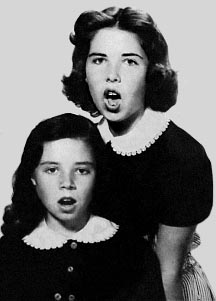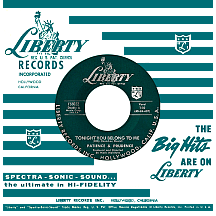PATIENCE AND PRUDENCE
Tonight You Belong to Me
Cute kids sell. Performing mature lyrics like 'My honey, I know with the dawn that you will be gone...' was the trick that worked for 14-year-old Patience McIntyre and her eleven-year-old sister Prudence. As of 1956 their father, pianist and bandleader Mark McIntyre, had logged nearly two decades in the music business, including several years as a backing musician for Frank Sinatra, in concert and on recordings. Raising his daughters in Los Angeles, he exposed them to all sorts of musical styles, from the black-and-white-key nuances of Frederic Chopin to the Broadway melodies of George Gershwin, classic Spanish guitar, the country and blues of East Texas (he was raised there), the jazz influences from which his career had risen and even the current rock and roll of Elvis Presley, a recently-crowned "king" the girls would soon be listed alongside on the best-selling singles charts.
Entertainment entrepreneur Billy Rose had, a generation earlier, attached lyrics to fellow New Yorker Lee David's melody for "Tonight You Belong to Me," an all-night-farewell breakup song recorded in 1926 by N.Y. band singer Irving Kaufman that was an early 1927 hit for Franklyn Baur (who became the original "Voice of Firestone" the following year on radio's Firestone Hour), bandleader Roger Wolfe Kahn (his version also featuring vocalist Baur) and most notably Texas-born singing star Gene Austin, whose 78 RPM was a number one hit in April '27. In 1953, Frankie Laine updated the song.
In 1956, a plan was in the works for Broadway actress and singer Lisa Kirk to record "A Smile and a Ribbon," a tune penned by Mark McIntyre and Kirk's husband, Robert Wells. Mark had younger daughter Prudence make a demo of the song that summer; just for fun, he utilized both girls' knack for harmony on "Tonight You Belong to Me" and the result was better than expected, so he sent a copy to Sy Waronker of Liberty Records. Sy rushed the girls into the Gold Star Studio on Santa Monica Blvd. to do a master take with a full orchestra. Meanwhile, Kirk's version of "A Smile and a Ribbon" came to life as a Columbia single backed by Percy Faith's orchestra and was featured on an episode of the CBS-TV series Front Row Center titled A Heart to Call My Own.
"Tonight You Belong to Me" became the debut single by Patience and Prudence on Liberty with Prudence's solo "Smile" on the flip; as it climbed the charts, McIntyre became concerned about the corrupting influence of show business (based on his own experiences) while label boss Waronker celebrated the company's second major hit ("come hither" girl Julie London had kickstarted the label's fortunes several months earlier with "Cry Me a River"). The P&P disc faced immediate competition from Lawrence Welk's cover on Coral featuring male group The Sparklers and made-to-order rivals The Lennon Sisters (with double the members ranging in age from ten to 16, they had the advantage of high-rated exposure on Welk's weekly ABC-TV variety series); there was also an older-skewing duet on Decca by a thirtysomething Karen Chandler and fortysomething Jimmy Wakely. Yet the McIntyre girls came out ahead, peaking at number four during a long top ten run spanning September through November (Welk's cover also did well with several weeks in the top 20, while Karen and Jimmy made a respectable showing in the top 50).

But could these sibling sweethearts score a second hit? They considered the first single an "accident," a term the McIntyre family used among themselves for years...yet another top seller would go far towards overruling such an assessment. The girls made one major TV appearance in September on the ninth-season opener of The Perry Como Show, then returned to the studio a couple of weeks later to lay down vocals for another big band number, "Gonna Get Along Without Ya Now." The song, originated by C&W singer Roy Hogsed in 1951, had been a hit for Teresa Brewer in '52, yet that rendition by the typically young-sounding Brewer felt matronly in comparison to the sweetly adorable condescension demonstrated by the McIntyre sister act; in December the song peaked just shy of the top ten. Waronker was elated, because after all, how could he have predicted what a powerhouse label Liberty would become over the next few years? As a bonus, dad Mark's B side composition with Cliff Ferré, "The Money Tree" ('...it's a beautiful sight to see...why couldn't it happen to you and me?'), spent two months on the charts in December '56 and January '57. Only with this particular selection, a cover by Margaret Whiting eclipsed its juvenile counterpart in overall popularity.
While the sisters continued recording for Liberty through 1959, Mark took an overprotective stance, rejecting offers for them to appear on variety shows, TV commercials and in movies, though he did allow their images to be used for several children's cut-out doll books featuring painted likenesses of the "Sister Singing Stars." A third single, "We Can't Sing Rhythm and Blues" (another McIntyre-Ferré tune), made its point, perhaps, too well. Sticking with that mindset, dad composed more cute songs ("You Tattletale") and collaborated with Ross Bagdasarian (several months prior to his chart-topping turn as David Seville directing a trio of singing Chipmunks) on "Over Here." Finally they gave rock and roll a whirl, coupling a girl-groupish ballad ("Heavenly Angel") with a mildly R&B-style uptempo number ("Little Wheel").
As of late '58, Liberty had put out eight singles by the duo (but no album!) with nary a sign of acceptance on the last six. A last-ditch switch in 1959 teamed them with teen idol discovery Mike Clifford on "Should I," featuring a clever little 'No, no, no..uh-uh' hook, but it didn't catch on. Clifford would have to wait another three years before rising on the charts with "Close to Cathy" on United Artists. Patience and "Pru" (I wonder if they ever referred to big sis as "Paysh") called it quits for the time being, carried on like regular teenagers, went to Girl Scout meetings, attended summer camp and finished their schooling. Five years later, at the ages of 22 and 19, they took another stab at stardom when Stan Ross, who'd engineered many of the Liberty sides, pitched the sibs to Ruth Conte, owner of Chattahoochee Records, who'd just made a splash with "Popsicles and Icicles" by The Murmaids, a hit with a youthful female sound not too far removed from what P&P had possessed back in '56. "Didn't I" retained the pre-teen sound of the sisters' Liberty material but seemed ill-timed to compete in the British-saturated environment of the moment.
Still working out of the Gold Star studio, the sisters did a peppier "Wrecking Crew" remake of "Tonight You Belong to Me" that can be compared favorably to the original. Nevertheless, it marked the end of their recording career. Mark McIntyre continued working in the business, but his daughters were no longer motivated. There was one final television appearance on the November 1978 special Dick Clark's Good Old Days; they didn't perform, opting instead to do a brief interview. Patience and Prudence repeated what had become a family motto: "It was just an accident."


